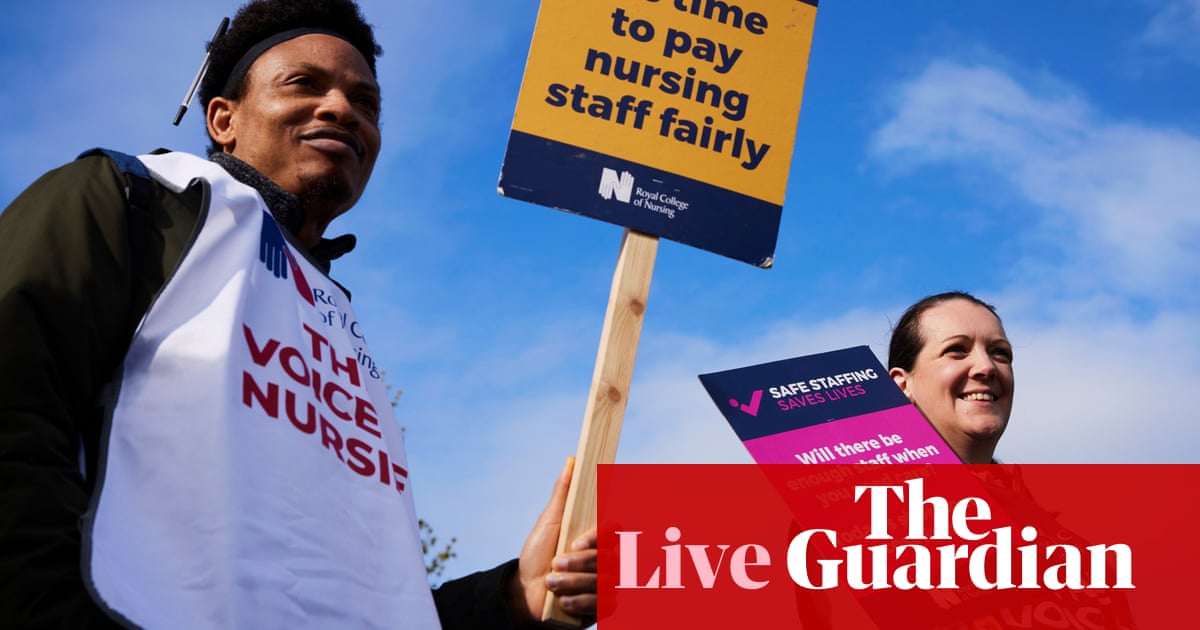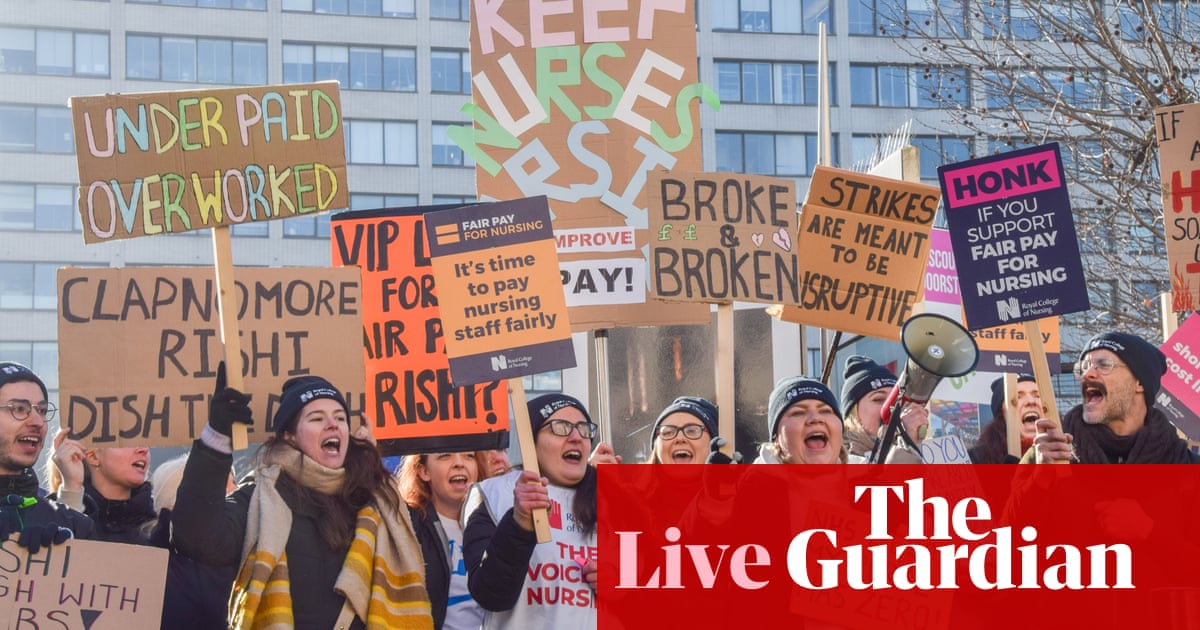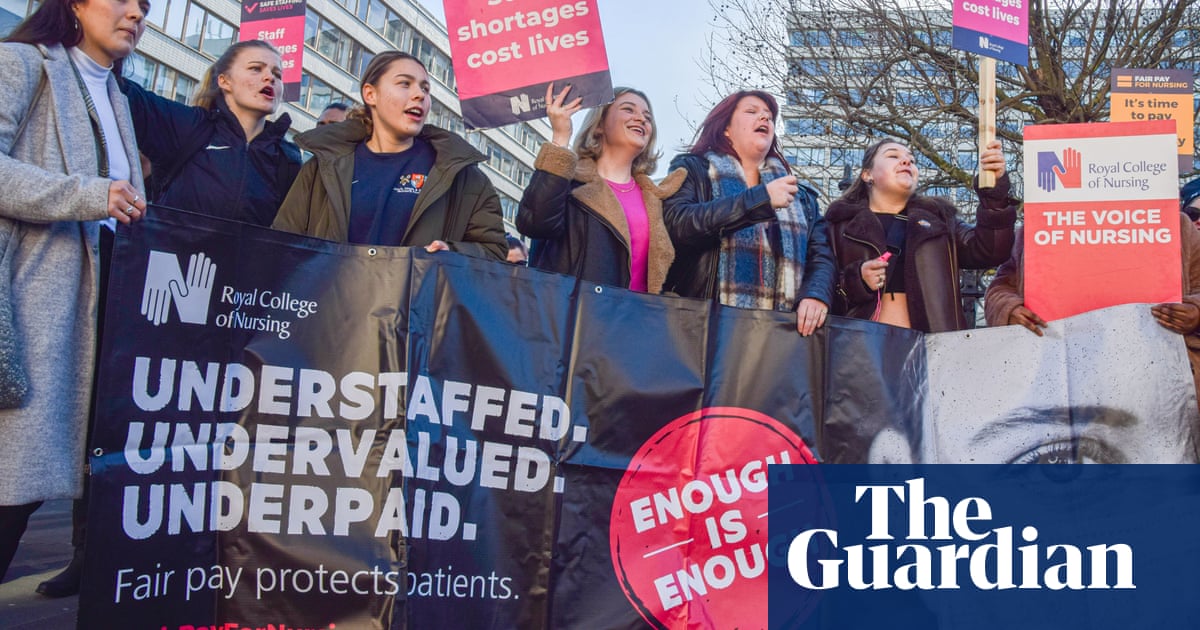
Labour MPs join nurses on picket lines
Numerous Labour MPs have joined nurses on picket lines in support of today’s strike.
The party leader, Sir Keir Starmer, has faced criticism from some over his muted backing of industrial action in various sectors in recent months.
Starmer has expressed sympathy for nurses and blamed the government for failing to avert the strikes through negotiations, but has kept in place a ban on members of his frontbench appearing on picket lines.
The backbencher Ian Byrne tweeted a number of photos of himself alongside nurses with Richard Burgon, Apsana Begum and Beth Winter.
The former shadow chancellor John McDonnell, Zarah Sultana, and Bell Ribeiro-Addy also tweeted photos of themselves on picket lines.
Summary
That’s all from our live coverage of the nurses strike for today. In case you missed anything, here’s a quick round-up of the day’s events.
Numerous Labour MPs joined nurses on picket lines in support of the strike. Party leader Sir Keir Starmer has faced criticism from some in recent months over his muted backing of industrial action.
Royal College of Nursing general secretary Pat Cullen said the day marked a “turning point in the campaign for fair nursing pay” and that ministers were now under “fresh pressure” on the issue.
A poll for YouGov found that 64% of the public supported nurses in their decision to strike, while 28% were opposed. Another poll, by Ipsos, found that 80% of people were concerned about the ability of the NHS to provide safe care for people during the strike.
NHS Confederation chief executive Matthew Taylor called on the government to act to prevent future strikes. “The worry is that this is just the start; that strikes possibly being planned for January could be more severe and coordinated across the different unions,” he said.
Former chair of the NHS pay review body Jerry Cope suggested ministers should ask the group to bring forward its next set of pay recommendations to account for the cost of living crisis.
A spokesperson for the prime minister said there were “no plans to tell the independent body what to do” and insisted the pay review bodies were genuinely independent.
The health secretary, Steve Barclay, ruled out moving on pay for nurses but claimed there is “room” for discussion. On a visit to London’s Chelsea and Westminster hospital, Barclay said he had had a meeting with trade unions in which they found common ground, but suggested their requests were unreasonable.
Two Tory MPs publicly called on the government to consider a more generous pay settlement for nurses. Former party chair Jake Berry said the government should “improve its offer”, while Dr Dan Poulter, who has worked as an NHS hospital doctor, said “inflation has significantly eroded [nurses’] real-terms pay”.
RMT Union chief Mick Lynch joined a picket line today in support of striking nurses.
Lynch has become a well-known figure in recent months, defending industrial action by his own members in frequent debates and interviews in the media.
The London branch of the Royal College of Nursing tweeted a photo of Lynch with a group of nurses outside St Mary’s hospital in west London.
One in eight adults in the UK have paid for private medical care in the last year because of long delays in getting NHS treatment, according to a new report by the Office for National Statistics.
A survey of 2,510 adults across the UK found that one in five were waiting for an appointment, test or treatment at an NHS hospital.
Of those in that situation:
Three-quarters said their delay had had either a strongly (34%) or slightly (42%) negative impact on their life
36% said waiting had made their condition worse
59% said it had damaged their wellbeing
A third said long waits had affected either their mobility (33%) or ability to exercise (34%)
Among the respondents, 5% said they had received private healthcare through private insurance, while 7% said they had paid for treatment themselves.
The first day of the nursing strike will mark a “turning point” in the push for better pay for nurses, the general secretary of the Royal College of Nursing has said.
In a statement, Pat Cullen said: “Today will be a turning point in the campaign for fair nursing pay. At the end of it, ministers find themselves under fresh pressure from unexpected places – their own MPs, NHS leaders and a former chair of the pay review body.”
Speaking on the Today programme this morning, Jerry Cope, who chaired the NHS pay review body from 2011-17, suggested ministers should ask the group to bring forward its next set of pay recommendations to account for the cost of living crisis.
Cullen continued: “Each of these groups, for different reasons, wants the Government to stop hiding behind its current fig leaf.
“On a bitterly cold day, the public warmth towards nursing staff was immense. For my members, this has been about professional pride, not personal hardship - speaking up for nursing, patients and the future of the NHS.”
Labour MPs join nurses on picket lines
Numerous Labour MPs have joined nurses on picket lines in support of today’s strike.
The party leader, Sir Keir Starmer, has faced criticism from some over his muted backing of industrial action in various sectors in recent months.
Starmer has expressed sympathy for nurses and blamed the government for failing to avert the strikes through negotiations, but has kept in place a ban on members of his frontbench appearing on picket lines.
The backbencher Ian Byrne tweeted a number of photos of himself alongside nurses with Richard Burgon, Apsana Begum and Beth Winter.
The former shadow chancellor John McDonnell, Zarah Sultana, and Bell Ribeiro-Addy also tweeted photos of themselves on picket lines.
Here are some pictures of nurses on the picket line outside Addenbrooke’s hospital in Cambridge.
Almost two thirds of the public support the decision of nurses to go on strike over pay, a poll has found.
The survey, conducted today by YouGov, found that 64% of people supported the action, while 28% were opposed.
Among Labour voters, overall support was 84%, while among Conservatives the figure was 48%.
Summary
Thanks for following the live updates. I will be handing over to my colleague Christy Cooney, so below is a summary of the main news of the day as nurses across England, Wales and Northern Ireland went on strike on Thursday, sparking major disruption to services in the first such action in NHS history.
The chief executive of the NHS Confederation called on the government to act and prevent future strikes as further industrial action is anticipated in January. “The worry is that this is just the start; that strikes possibly being planned for January could be more severe and coordinated across the different unions,” Matthew Taylor said.
Nurses will start striking for longer, at more places and will disrupt more NHS services from next month unless the government increases its pay offer, hospital bosses have suggested. A second 12-hour stoppage is due next Tuesday at dozens of hospitals, mental health units and specialist care providers, such as children’s hospitals.
The health secretary, Steve Barclay, ruled out moving on pay for nurses but claimed there is “room” for discussion. On a visit to London’s Chelsea and Westminster hospital, Barclay said he had a meeting with trade unions in which they found common ground, but suggested their requests were unreasonable.
The GMB union became the first to reject a deal from the Scottish government that offered pay rises ranging from £2,205 to £2,751, which ministers said meant NHS workers in Scotland would remain the best paid in the UK. 66% of respondents to the GMB ballot voted against the offer which would have given the lowest-paid staff a rise of 11.3%, with an average increase of 7.5%.
The NHS pay review body can’t change its recommendation as it would be “dangerous” for trade unions and the government, said the former chair of the body. Jerry Cope told BBC News the government could request the next report quicker, and for it to include any new evidence since the pay recommendations were made in February.
The Conservative chair of the health select committee said it would be a “sensible answer” for government ministers to ask the NHS pay review body to reconsider the pay rise recommendation for nurses. MP Steve Brine said: “The way out is to protect the integrity of the process, go back and ask them to look again.”
Four in five Britons are concerned about patient care and safety amid strikes, according to a new poll. The poll by Ipsos of 1,100 adults found that 80% were very or fairly concerned about the ability of the NHS to provide safe care for people during the nurses’ strike.
Nurses demanding a 19% pay rise is “not affordable” in the face of economic pressures, the health secretary, Steve Barclay said. “We also recognise the huge contribution that we saw from nurses during the pandemic and that’s why last year we made a special case where nurses got an extra 3% when others in the public sector did not,” he said in a TV interview.
At the morning lobby briefing, the PM’s spokesperson played down the prospect of the NHS pay review body being asked to update its recommendations for nurses. The PM’s spokesperson said there were “no plans to tell the independent body what to do” and insisted the pay review bodies were genuinely independent.
Dr Dan Poulter, who represents Central Suffolk and North Ipswich in the House of Commons, urged the government to “improve on the current offer on the table for nurses”, saying there was a “good economic case” for doing so. Poulter has also worked as an NHS hospital doctor specialising in mental health services. The comments came after Jake Berry, a former Conservative party chairman, said the government should “improve its offer”.
Pat Cullen, the Royal College of Nursing chief executive, said there is “nothing independent” about the pay review body process, and added that “hundreds of nurses” are leaving the profession every day. “This is a tragic day for nurses, a tragic day for patients … and it’s a tragic day for the people of society and for our NHS,” she told BBC Breakfast.
Health minister Maria Caulfield said that borrowing could not be used for spending on a larger pay award for nurses due to the failures of Liz Truss’s mini-budget. “We could’ve ignored the pay review body’s recommendation and gone for a much lower pay rise – we could go higher, but we have got to find that money from somewhere,” she told Sky News.
The former head of the NHS pay review body, Jerry Cope, said ministers should ask the body to reconsider the pay rise recommended and consider how inflation has soared. “That may be a possibility for a solution for this apparently intractable problem,” he told BBC’s Radio 4 Today programme.
Saffron Cordery, the interim chief executive of NHS Providers, said that the NHS trusts were “pulling out all the stops” to lessen the impact on patients. “On strike days, NHS trusts will do everything they can to ensure that essential services are properly staffed and patient safety, always the number one priority, is safeguarded,” she told PA news.
Here is a Q&A about why nurses are striking, what the pay offer was, and other critical questions about why the strikes are happening.
Tell us: have you been affected by the strikes?
Nurses in England, Wales and Northern Ireland: share your views on the RCN strike.
The Covid pandemic has eased, so why is the health service facing its worst winter yet? And how is it coping with endless waiting lists, a staffing crisis and strikes?
From GP surgeries to pharmacies to hospitals, there is no part of the NHS that is not feeling under enormous strain this winter. Thirty-three months after Covid was declared a pandemic, Andrew Gregory, the Guardian’s health editor, and his colleagues spent hours on the frontline of the NHS to find out how doctors, nurses, paramedics – and the patients they treat – were coping.
He told Michael Safi how in one hospital he found demoralised, exhausted staff, ambulances waiting for hours and a seemingly endless battle to keep waiting lists down. Yet the pressure is also adding to problems outside hospitals, at local GP practices and even at high street pharmacies. So what’s behind the NHS’s worst ever winter – and what role is Covid playing in all this?
The chief executive of the NHS Confederation has called on the government to act to prevent future strikes as further industrial action is anticipated in January.
“The worry is that this is just the start; that strikes possibly being planned for January could be more severe and coordinated across the different unions, and that we could be in a position of stalemate for the foreseeable future,” Matthew Taylor said.
“This benefits no one and the government must act,” Taylor said, according to PA Media.
Taylor said that while the first strike had gone as planned, with the NHS able to maintain safe staffing levels across key services, the government “cannot just sit back” and let future strikes happen when “patient care is on the line”.
Guardian staff have been speaking with individuals affected by today’s planned industrial action.
Joe* was due to have medical tests in Bristol on Thursday, only to learn they were cancelled because of the strikes. While he is frustrated by the delay, he said he is more frustrated by the government’s choice not to negotiate with unions.
“I have a heart condition so I go for tests every couple of years or so,” said Joe. “I’ve been waiting most of the year for it and I had a phone call earlier this morning to tell me not to come because [the nurses] are not going to be there today.
“I’m more frustrated with the state of the government and them not even making an effort to try and avoid [the strikes] when they’ve been given plenty of chances to do so,” he said.
The wave of strikes sweeping the country reaches a peak this week, threatening to bring Britain to a standstill as workers across the NHS, transport network, Royal Mail and civil service take industrial action in ongoing disputes over pay and conditions.
Further unrest could beset the government in the new year as strike ballots for firefighters and teachers close in January, while junior doctors are scheduled to vote next month, and London Underground workers have approved a mandate for another six months of industrial action.
My colleague Neelam Tailor spoke with four people across England – a paramedic, a teacher, a firefighter, and a train driver – about why they are striking, the realities of being a public sector worker during a cost of living crisis, and whether they are hopeful that this action could lead to change in their industry.
Is Boris Johnson, forced to get by on £750k of chicken feed, striking too?
Shortly after 9.30am, the green benches were almost half full. For a minute’s silence to remember the 80th anniversary of the first public declaration of the Holocaust by the then foreign secretary, Anthony Eden, in the Commons. It was a powerful and moving moment. The Commons is often at its best when it says nothing at all.
Then, just as quickly as they had appeared, nearly all the MPs vanished into the ether. They had either done their bit for the day and were taking the opportunity to nip off home early for Christmas or were staging their own strike. Hell, many workers elsewhere in the country were taking industrial action, so why shouldn’t MPs? After all it’s been a hell of a year, what with the three prime ministers. Each, in their own way, worse than the last. Who wouldn’t want to be better paid for dealing with all that crap?
Some might have even chosen to join the nurses – starting their first strike in more than 100 years – on the picket line. Take the Tory MP and chair of the northern research group, Jake Berry. He’s struggled to find any government policy with which he agrees.












